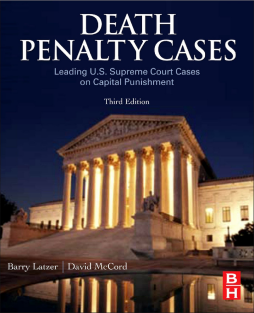
Additional Information
Book Details
Abstract
Death Penalty Cases presents significant verbatim excerpts of death-penalty decisions from the United States Supreme Court. The first chapter introduces the topics discussed throughout the book. It also includes a detailed history of the death penalty in the United States. After this introduction, the remaining eighteen chapters are divided into five parts: Foundational Cases, Death-Eligible Crimes and Persons, The Death Penalty Trial, Post-Conviction Review, and Execution Issues.
The first part, consisting of five chapters, talks about the mandatory death penalty, mitigating evidence and racial bias. The next part covers death-eligible crimes, such as rape and other crimes that do not involve homicide and murder. The middle part presents the trial process, from choosing the appropriate decision-makers through the sentencing decision. Followed by this is a chapter focusing on the aftermath of conviction, such as claims of innocence. The book concludes by exploring issues related to execution, such as not executing insane convicts. Finally, execution methods are presented.
- Provides the most recent case material--no need to supplement
- Topical organization of cases provides a more logical organization for structuring a course
- Co-authors with different perspectives on the death penalty assures complete impartiality of the material
- Provides the necessary historical background, a clear explanation of the current capital case process, and an impartial description of the controversies surrounding the death penalty
- Provides the latest statistics relevant to discussions on the death penalty
- Clearly explains the different ways in which the states process death penalty cases, with excerpts of the most relevant statutes
"Barry Latzer and David McCord’s latest edition of Death Penalty Cases breaks new ground in providing thoughtful and balanced analysis of all important legal issues surrounding the death penalty. From the subject of why we should have (or not have) capital punishment, to the Supreme Court’s jurisprudence on cruel and unusual punishment, to victim impact evidence and claims of actual innocence, the inquiring reader will find penetrating dissections of every major topic swirling around the death penalty debate. This book moves far beyond sloganeering to expose the fault lines in the debates and gives both sides their due. For anyone who truly wants to understand the law surrounding capital punishment, Death Penalty Cases, Third Edition is a 'must read." --Paul G. Cassell, Ronald N. Boyce Presidential Professor of Criminal Law, S.J. Quinney College of Law-University of Utah
"This volume is a gem. Latzer and McCord have carefully selected and edited landmark Supreme Court decisions encompassing the justice’s far-ranging, fascinating, and inevitably controversial capital punishment jurisprudence. The result is a compact, highly useful, comprehensive, and—to their great credit—balanced and even-handed representation of the complex constitutional, ethical, and empirical issues that distinguish this compelling body of law. " --James R. Acker, Distinguished Teaching Professor, School of Criminal Justice, SUNY-Albany
"Given the attention paid to the death penalty by judges, lawyers and the public, I always have been surprised by the difficulty of finding a first-rate casebook to teach the subject. With this book, Barry Latzer and David McCord have admirably met that challenge. Their organization, with cases edited to just the right level of comprehensiveness for teaching, sets out the perfect blueprint from which the student can build an understanding of the intricacies of the Supreme Court's death penalty jurisprudence." --Scott Sundby, Sydney and Francis Lewis Professor, Washington and Lee University School of Law
"The chief strengths of Death Penalty Cases are that it is beautifully edited and that it is comprehensive, and the new structure of the third edition -- organized around five sections -- is brilliant." --Beau Breslin, PhD, Assistant Dean of the Faculty, Director of the First-Year Experience, and Professor of Government, Skidmore College
